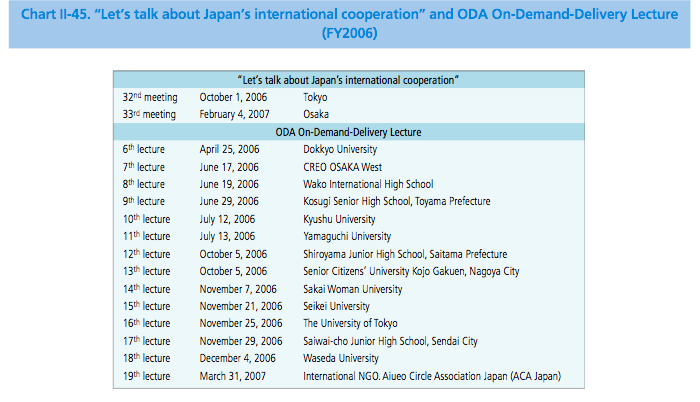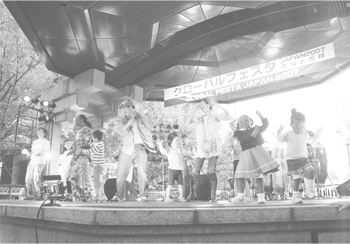Japan's Official Development Assistance White Paper 2007
Main Text > Part II ODA ODA Record for FY2006 > Chapter 2 Details about Japan's Official Development Assistance > Section 6. Formulation and Implementation of Aid Policy > 2. Increasing Public Participation > (4) Information Disclosure and Public Relations
(4) Information Disclosure and Public Relations
ODA plays a big role in Japan's diplomacy. It is essential to gain widespread public understanding of and support for international cooperation. For this reason, the Government is working on a broader disclosure of information on its international cooperation.
<Vigorous Public Relations and Provision of Information within Japan>
Specific measures to provide information concerning international cooperation and create opportunities for Japanese citizens to come into contact with cooperative activities include the issuance of government publications such as the ODA White Paper and the Diplomatic Blue Book, as well as the following:
● Websites, E-Mail Magazines, and Newspapers
Designed to enhance disclosure of information, the ODA websites of MOFA, as well as the ODA websites of JICA, JBIC, the Plaza for International Cooperation, and other organizations relay timely information concerning international cooperation and provide introductions to international cooperation in easy-to-understand formats.13
In addition to the websites, MOFA also issues the e-mail magazine. As of March 22, 2007, the ODA Mail Magazine had been issued 111 times. The magazine relays timely topics and information relating to economic cooperation and includes episodes written by Japanese embassy staff members, JOCVs, and Senior Volunteers about their actual experiences in the field, as well as introducing ODA-related anecdotes. Anyone can receive the magazine by registering on the ODA website. As of the end of March 2007, about 14,100 people had registered.
MOFA also issues the Kokusai Kyoryoku Newspaper which contains the latest information regarding international cooperation on a monthly basis. The newspapers are distributed to educational institutions, libraries, and similar locations around the country.
● Dialogue with the Public
As part of efforts to promote dialogue with the public, symposiums named "Let's talk about Japan's International Cooperation" are held at various places around the country to inform the public of the present situation surrounding Japan's international cooperation including its ODA reform and to listen directly to the opinions of the general public. By February 2007, 33 symposiums had been held where frank discussions took place between experts, staff members of MOFA, and the general public.
And as a more flexible way to promote dialogue with the public, MOFA began the ODA On-Demand-Delivery Lecture from October 2005. In the lecture series, personnel from the then Economic Cooperation Bureau of MOFA14 visit middle schools and high schools, colleges, graduate schools, local municipalities (international associations), NGOs, and similar venues to talk about international cooperation. The lecture series has been held 19 times as of March 2007.
Chart II-45 "Let's talk about Japan's international cooperaton" and ODA On-Demand-Delivery Lecture

● ODA Citizen Monitoring Program
The aim of the ODA Citizen Monitoring Program is to promote a proper understanding of the significance and importance of international cooperation and receive views and opinions from the public by dispatching monitors selected from the general public who are interested in international cooperation to project sites, thereby giving them a firsthand opportunity to visit Japan's ODA project sites. This program started in FY1999, and by FY2007 a total of 704 monitors had viewed 479 ODA project sites in 28 developing countries in Asia, Africa, and Latin America. Participants have reported, for example, that they have deepened their understanding of the role that ODA plays in the development and stability of developing countries and of the need for such assistance. Moreover, there are also people who have deepened their interest in international cooperation and decided to take part in international cooperation as JOCV and Senior Volunteers on the incentive of their participation as monitors. The public's understanding of international cooperation is expected to continue to expand through these activities.
● Television Programs for Public Relations in Japan
Since FY1997 the government has created and televised a series of regular programs on its development assistance that give viewers a notion of the conditions that exist in developing countries, the need for assistance, the residents who participate in and benefit from projects, and the Japanese who implement these projects. The series is designed to introduce, to as many members of the public as possible, how Japan's international cooperation is regarded by developing countries and what benefits it has brought, and to increase the interest and deepen the understanding of international cooperation on the part of viewers. In FY2006, four-minute programs called "CHIKYU Supporter by Tomohiro Sekiguchi" featuring Laos, Iraq, Tanzania, El Salvador, Mongolia, Pakistan, and Turkey were televised once each week, with the average ratings reaching 5.3%. In response to widespread requests from citizens for nationwide broadcast, an omnibus edition was broadcast on satellite. Broadcasts of "CHIKYU Supporter by Tomohiro Sekiguchi" have continued into FY2007.
● Global Festa JAPAN
Since 1990, the International Cooperation Festival has been held annually on International Cooperation Day (October 6)15 as Japan's largest international cooperation event. In order to encourage participation by the younger generation and others who are unfamiliar with international cooperation, the name of the event was changed to Global Festa JAPAN in 2005. Co-sponsored by MOFA, JICA, JBIC and JANIC (Japan NGO Center for International Cooperation), Global Festa JAPAN is held on Saturday and Sunday at Hibiya Park in Tokyo. Over 200 organizations including government, NGOs, international agencies and embassies of various countries present exhibits at the festival. In order to deepen the familiarity with international cooperation of visitors and promote their understanding of the state and necessity of international cooperation, including development assistance, and of cooperation between governments and NGOs, presentations are given in the tents of exhibiting organizations, and many enjoyable events are held, including dances, music, quiz contests, charity runs and workshops.
Every year, a uniform theme is adopted for the Global Festa JAPAN. The theme adopted for 2006 was "FOOD: from a development perspective." Under this theme, understanding of international cooperation and developing countries was promoted by focusing on food, a subject of concern to everyone, taking up topics such as food conditions in developing countries, food aid by Japan, the food cultures of various countries, and food safety. The Global Festa JAPAN 2007 held on October 6-7, 2007 adopted the theme "Family and Earth" with a view to promoting understanding of international cooperation and developing counties by encouraging visitors to think of it through their relations with their family, the center of our daily lives, with the neighboring region, the environment, and the world. Over its two-day period, the festival attracted 80,000 visitors. The 2007 festival was the first to attempt to gain the support of private sector enterprises. Through exhibits and attractions presented at company booths, visitors were able to see that Japan's international cooperation is supported not only by government, international agencies and NGOs, but also by the wide-ranging activities of private enterprises. In addition, MOFA invited UNDP Goodwill Ambassador Misako Konno and others to participate in the panel discussion, "Let's Talk about International Cooperation," and the mini symposium, "Partnership with NGOs in International Cooperation." At the MOFA tent, visitors were invited to make a "Declaration of My International Cooperation" — what they too can do in their everyday lives to support developing countries, with a view to fostering their participation in international cooperation. A talk show on international cooperation was also made by Tomohiro Sekiguchi and Kaori Manabe. It is expected that through such events more people will acquire a deeper understanding of international cooperation and be encouraged to participate in international cooperation.
See Section 6 for more information about Tomohiro Sekiguchi
A brief conversation with Kaori Manabe, who participated in Global Festa JAPAN2007.
 We have heard that you previously had no experience in international cooperation.
We have heard that you previously had no experience in international cooperation.
"I have some friends from college who have had some experience in international cooperation, but I had thought that for ordinary people, including myself, international cooperation seemed distant and far away."
 At present, the international community, including Japan, is strengthening efforts to aid Africa.
At present, the international community, including Japan, is strengthening efforts to aid Africa.
"I am now buying fair trade products via the Internet, so I do not feel that Africa is so far away."
 So then, you actually have participated in international cooperation.
So then, you actually have participated in international cooperation.
"Yes, I have. I would like to help developing countries in my own daily life by consciously purchasing environmentally-friendly products and fair trade products, and to play a part by learning about international cooperation activities and spreading the word."
 We have heard that you previously had no experience in international cooperation.
We have heard that you previously had no experience in international cooperation. "I have some friends from college who have had some experience in international cooperation, but I had thought that for ordinary people, including myself, international cooperation seemed distant and far away."
 At present, the international community, including Japan, is strengthening efforts to aid Africa.
At present, the international community, including Japan, is strengthening efforts to aid Africa."I am now buying fair trade products via the Internet, so I do not feel that Africa is so far away."
 So then, you actually have participated in international cooperation.
So then, you actually have participated in international cooperation. "Yes, I have. I would like to help developing countries in my own daily life by consciously purchasing environmentally-friendly products and fair trade products, and to play a part by learning about international cooperation activities and spreading the word."

"African music and dance performance" at the Global Festa JAPAN 2007
<Enhancing of the Dissemination of Information to the International Community>
In addition to public relations within Japan, it is also important that Japan's active international contribution through ODA is properly understood and supported overseas.
In order to ensure that Japan's assistance is evaluated correctly overseas and to publicize individual projects implemented through Japan's assistance, Japan has participated in interviews with the local press in addition to offering press releases at signings and handover ceremonies, attaching Japanese flag stickers (in English or Arabic) and the Japanese ODA logo (in English, French, Spanish, Arabic, Portuguese or Chinese) to goods supplied through assistance, and setting up signboards, etc.
In order to publicize Japan's assistance policies and their results widely to the peoples of recipient countries, Japan has broadcast television programs to introduce Japan's development assistance. In FY2006, programs were televised in seven countries, including Nepal, Bulgaria, El Salvador and Mongolia. Japanese embassies arranged visits to Japan's ODA project sites for the local press and created opportunities for the local media to gather information on Japan's assistance projects. Furthermore, Japanese embassies disseminated information via various lectures, as well as websites and e-mail bulletins prepared in both English and local languages. In cooperation with JICA and JBIC, Japanese embassies prepared and distributed various pamphlets concerning Japan's international cooperation. To the international community as well, including other donor countries and organizations, Japan is taking active measures to disseminate information through daily diplomatic efforts and international conferences, as well as through various symposiums, seminars, and websites.


 Next Page
Next Page